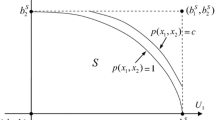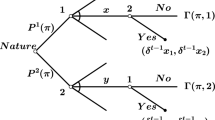Abstract
We characterize equilibrium behavior in a finite horizon multiple-pie alternating offer bargaining game in which both agents have outside options and threat points. In contrast to the infinite horizon case the strength of the threat to delay agreement is non-stationary and decreases over time. Typically the delay threat determines equilibrium proposals in early periods, while the threat to opt out characterizes those in later ones. Owing to this non-stationarity both threats may appear in the equilibrium shares immediately agreed upon in the first period. When the threat to opt out is empty for both agents, the outcome corresponds exactly with the (generalized) Nash bargaining solution. The latter observation may prove useful for designing experiments that are meant to test economic models that include a bargaining stage.
Similar content being viewed by others
References
K. Binmore P. Morgan A. Shaked J. Sutton (1991) ArticleTitleDo People Exploit their Bargaining Power? An Experimental Study Games and Economic Behavior 3 295–322
K. Binmore A. Rubinstein A. Wolinski (1986) ArticleTitleThe Nash Bargaining Solution in Economic Modeling Rand Journal of Economics 17 176–188
K. Binmore A. Shaked J. Sutton (1989) ArticleTitleAn Outside Option Experiment Quarterly Journal of Economics 104 753–770
C. Camerer K. Weigelt (1996) An Asset Market Test of a Mechanism for Inducing Stochastic Horizons in Experiments R. Isaac (Eds) Research in Experimental Economics, Vol. 6 JAI Press Greenwich, CT 213–238
Y. Chiu B. Yang (1999) ArticleTitleThe Outside Option, Threat Point, and Nash Bargaining Solution Economics Letters 62 181–188
M. Coles A. Muthoo (2003) ArticleTitleBargaining Equilibrium in a Non-stationary Environment Journal of Economic Theory 109 70–89
A. Dalmazzo (1992) ArticleTitleOutside Options in a Bargaining Model with Decay in the Size of the Cake Economics Letters 40 417–421
C. Ferstman D. Seidmann (1991) ArticleTitleDeadline Effects and Inefficient Delay in Bargaining with Endogenous Commitment Journal of Economic Theory 60 306–321
W. Güth P. Ockenfels K. Ritzberger (1995) ArticleTitleOn Durable Goods Monopolies: An Experimental Study of Intrapersonal Price Competition and Price Discrimination Over Time Journal of Economic Psychology 16 247–274
S. Hackett (1994) ArticleTitleIs Relational Exchange Possible in the Absence of Reputations and Repeated Contract? Journal of Law, Economics and Organization 10 360–389
J. Harrington (1986) ArticleTitleA Non-cooperative Bargaining Game with Risk-averse Players and an Uncertain Finite Horizon Economics Letters 20 9–13
O. Hart (1989) ArticleTitleBargaining and Strikes Quarterly Journal of Economics 104 25–43
P. Jehiel B. Moldovanu (1995) ArticleTitleNegative Externalities may cause Delay in Negotiation Econometrica 63 1321–1335
C.-T. Ma M. Manove (1993) ArticleTitleBargaining with Deadlines and Imperfect Player Control Econometrica 61 1313–1339
W. MacLeod J. Malcomson (1995) ArticleTitleContract Bargaining with Symmetric Information Canadian Journal of Economics 28 336–367
J. Malcomson (1997) ArticleTitleContracts, Holdup, and Labor Markets Journal of Economic Literature 35 1916–1957
A. Mas-Colell M. Whinston J. Green (1995) Microeconomic Theory Oxford University Press Oxford
E. Moen (1998) ArticleTitleEfficient Ways to Finance Human Capital Investments Economica 65 491–505
A. Muthoo (1999) Bargaining Theory with Applications Cambridge University Press Cambridge
H. Oosterbeek J. Sonnemans S. Velzen Particlevan (2003) ArticleTitleThe Need for Marriage Contracts: An Experimental Study Journal of Population Economics 16 431–453
M. Osborne A. Rubinstein (1994) A Course in Game Theory MIT Press Cambridge
M.J. Osborne A. Rubinstein (1990) Bargaining and Markets Academic Press San Diego
C. Ponsati (1995) ArticleTitleThe Deadline Effect: A Theoretical Note Economics Letters 48 281–285
C. Ponsati J. Sákovics (1998) ArticleTitleRubinstein Bargaining with Two-sided Outside Options Economic Theory 11 667–672
A. Rapoport E. Weg D. Felsenthal (1990) ArticleTitleEffects of Fixed Costs in Two-person Sequential Bargaining Theory and Decision 28 47–71
A. Rubinstein (1982) ArticleTitlePerfect Equilibrium in a Bargaining Model Econometrica 50 97–109
A. Shaked (1994) ArticleTitleOpting Out: Bazaars Versus ‘High Tech’ Markets Investigaciones Económicas 18 421–432
Sloof, R. (2002). Opting Out: An Experimental Comparison of Bazaars Versus High-tech Markets. WP 29/02, Scholar Working Paper Series, University of Amsterdam.
Sloof, R., Oosterbeek, H., Riedl, A. and Sonnemans, J. (2002). Breach Remedies, Reliance and Renegotiation. Scholar Working Paper Series WP 28/02.
R. Sloof J. Sonnemans H. Oosterbeek (2004) ArticleTitleSpecific Investments, Holdup, and the Outside Option Principle European Economic Review 48 1399–1410
J. Sonnemans H. Oosterbeek R. Sloof (2001) ArticleTitleOn the Relation between Asset Ownership and Specific Investments Economic Journal 111 791–820
I. Stahl (1972) Bargaining Theory Economics Research Institute at the Stockholm School of Economics Stockholm
E. Damme Particlevan R. Selten E. Winter (1990) ArticleTitleAlternating Bid Bargaining with a Smallest Money Unit Games and Economic Behavior 2 188–201
E. Weg A. Rapoport D. Felsenthal (1990) ArticleTitleTwo-person Bargaining behavior in Fixed Discounting Factors Games with Infinite Horizon Games and Economic Behavior 2 76–95
R. Zwick A. Rapoport J. Howard (1992) ArticleTitleTwo-person Sequential Bargaining Behavior with Exogenous Breakdown Theory and Decision 32 241–268
Author information
Authors and Affiliations
Corresponding author
Additional information
JEL CLASSIFICATION CODES: C78, C91.
The useful remarks of an anonymous referee greatly improved the presentation of the material and are gratefully acknowledged. The usual disclaimer applies.
Rights and permissions
About this article
Cite this article
Sloof, R. Finite Horizon Bargaining With Outside Options And Threat Points. Theor Decis 57, 109–142 (2004). https://doi.org/10.1007/s11238-004-4319-5
Published:
Issue Date:
DOI: https://doi.org/10.1007/s11238-004-4319-5




